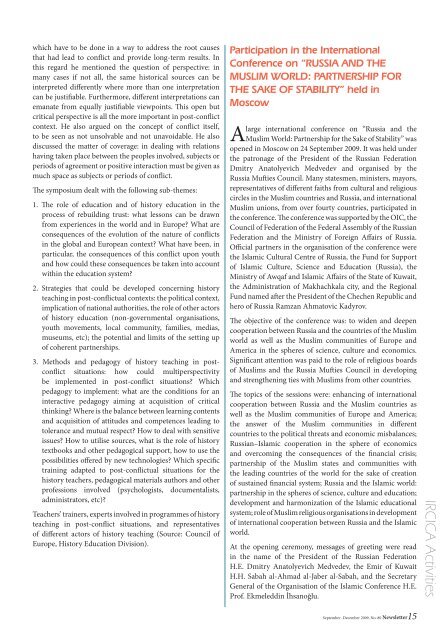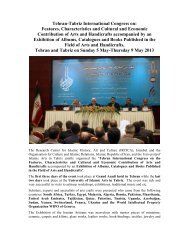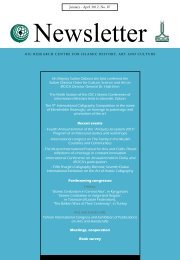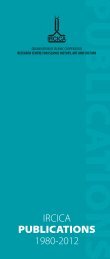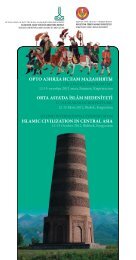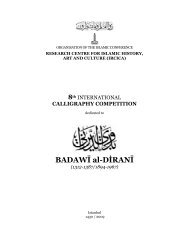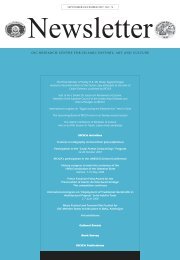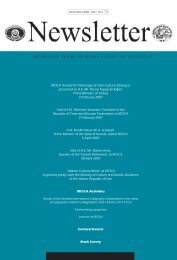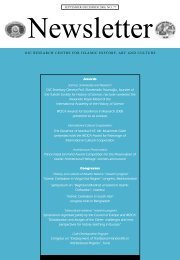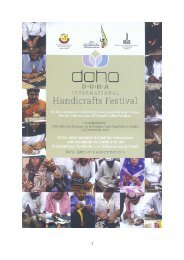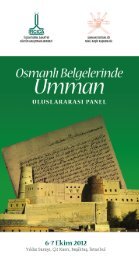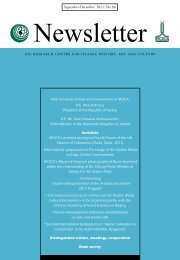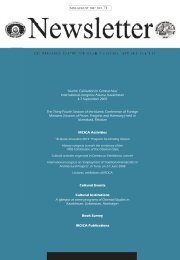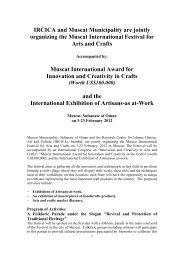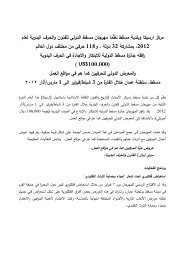Create successful ePaper yourself
Turn your PDF publications into a flip-book with our unique Google optimized e-Paper software.
which have to be done in a way to address the root causesthat had lead to conflict and provide long-term results. Inthis regard he mentioned the question of perspective: inmany cases if not all, the same historical sources can beinterpreted differently where more than one interpretationcan be justifiable. Furthermore, different interpretations canemanate from equally justifiable viewpoints. This open butcritical perspective is all the more important in post-conflictcontext. He also argued on the concept of conflict itself,to be seen as not unsolvable and not unavoidable. He alsodiscussed the matter of coverage: in dealing with relationshaving taken place between the peoples involved, subjects orperiods of agreement or positive interaction must be given asmuch space as subjects or periods of conflict.The symposium dealt with the following sub-themes:1. The role of education and of history education in theprocess of rebuilding trust: what lessons can be drawnfrom experiences in the world and in Europe? What areconsequences of the evolution of the nature of conflictsin the global and European context? What have been, inparticular, the consequences of this conflict upon youthand how could these consequences be taken into accountwithin the education system?2. Strategies that could be developed concerning historyteaching in post-conflictual contexts: the political context,implication of national authorities, the role of other actorsof history education (non-governmental organisations,youth movements, local community, families, medias,museums, etc); the potential and limits of the setting upof coherent partnerships.3. Methods and pedagogy of history teaching in postconflictsituations: how could multiperspectivitybe implemented in post-conflict situations? Whichpedagogy to implement: what are the conditions for aninteractive pedagogy aiming at acquisition of criticalthinking? Where is the balance between learning contentsand acquisition of attitudes and competences leading totolerance and mutual respect? How to deal with sensitiveissues? How to utilise sources, what is the role of historytextbooks and other pedagogical support, how to use thepossibilities offered by new technologies? Which specifictraining adapted to post-conflictual situations for thehistory teachers, pedagogical materials authors and otherprofessions involved (psychologists, documentalists,administrators, etc)?Teachers’ trainers, experts involved in programmes of historyteaching in post-conflict situations, and representativesof different actors of history teaching (Source: Council ofEurope, History Education Division).Participation in the InternationalConference on “RUSSIA AND THEMUSLIM WORLD: PARTNERSHIP FORTHE SAKE OF STABILITY” held inMoscowlarge international conference on “Russia and theA Muslim World: Partnership for the Sake of Stability” wasopened in Moscow on 24 September 2009. It was held underthe patronage of the President of the Russian FederationDmitry Anatolyevich Medvedev and organised by theRussia Mufties Council. Many statesmen, ministers, mayors,representatives of different faiths from cultural and religiouscircles in the Muslim countries and Russia, and internationalMuslim unions, from over fourty countries, participated inthe conference. The conference was supported by the OIC, theCouncil of Federation of the Federal Assembly of the RussianFederation and the Ministry of Foreign Affairs of Russia.Official partners in the organisation of the conference werethe Islamic Cultural Centre of Russia, the Fund for Supportof Islamic Culture, Science and Education (Russia), theMinistry of Awqaf and Islamic Affairs of the State of Kuwait,the Administration of Makhachkala city, and the RegionalFund named after the President of the Chechen Republic andhero of Russia Ramzan Ahmatovic Kadyrov.The objective of the conference was: to widen and deepencooperation between Russia and the countries of the Muslimworld as well as the Muslim communities of Europe andAmerica in the spheres of science, culture and economics.Significant attention was paid to the role of religious boardsof Muslims and the Russia Mufties Council in developingand strengthening ties with Muslims from other countries.The topics of the sessions were: enhancing of internationalcooperation between Russia and the Muslim countries aswell as the Muslim communities of Europe and America;the answer of the Muslim communities in differentcountries to the political threats and economic misbalances;Russian–Islamic cooperation in the sphere of economicsand overcoming the consequences of the financial crisis;partnership of the Muslim states and communities withthe leading countries of the world for the sake of creationof sustained financial system; Russia and the Islamic world:partnership in the spheres of science, culture and education;development and harmonization of the Islamic educationalsystem; role of Muslim religious organisations in developmentof international cooperation between Russia and the Islamicworld.At the opening ceremony, messages of greeting were readin the name of the President of the Russian FederationH.E. Dmitry Anatolyevich Medvedev, the Emir of KuwaitH.H. Sabah al-Ahmad al-Jaber al-Sabah, and the SecretaryGeneral of the Organisation of the Islamic Conference H.E.Prof. Ekmeleddin İhsanoğlu.IRCICA ActivitiesSeptember -December 2009, No: 80 Newsletter 15


